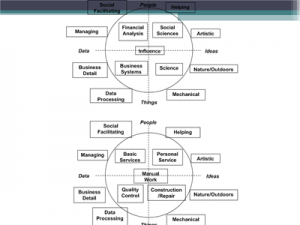 The Personal Globe Inventory (PGI) is a new interest inventory based on a spherical model of interests that measures activity preferences, activity competence beliefs, and occupational preferences. The PGI is unique in that it explicitly incorporates prestige as a prominent factor in interest assessment. Through the use of innovative features in profile interpretation, the PGI offers individualized profiles, thus providing an assessment that may be applicable to many users at various points in their career development.
The Personal Globe Inventory (PGI) is a new interest inventory based on a spherical model of interests that measures activity preferences, activity competence beliefs, and occupational preferences. The PGI is unique in that it explicitly incorporates prestige as a prominent factor in interest assessment. Through the use of innovative features in profile interpretation, the PGI offers individualized profiles, thus providing an assessment that may be applicable to many users at various points in their career development.
The globe model is an extension of John Holland’s six-type model. He proposed that interests can be characterized by six personality types (i.e., Realistic, Investigative, Artistic, Social, Enterprising, and Conventional) and that these six RIASEC types are arranged in a hexagon. The development of the spherical structure of interests evolved out of a series of studies conducted by Terence Tracey and James Rounds. Their exploratory research demonstrated that an eight-type model of interests fits their data well or better than Holland’s six-type model, pointing to the arbitrary nature of Holland’s RIASEC types. In addition to validating the presence of the two dimensions typically found in interest data, Dale Prediger’s People/Things and Data/Ideas, they found a third dimension of prestige, a salient but often overlooked variable in vocational interest assessments.
Best conceptualized as an occupational interest globe with the dimension of prestige represented along the north pole-south pole axis and differentiating interest areas. With the addition of the dimension of prestige, the PGI yields scores from 18 spherical scales that represent three dimensions of People/Things, Data/Ideas, and Prestige. In addition, the PGI also yields information
provided by many other interest inventories scores including eight basic interest scales (e.g., social facilitating, helping, artistic, nature/outdoors, mechanical, data processing, business detail, and managing), six RIASEC scales, and Prediger’s two dimensions. Research on the psychometric properties of the PGI supports its reliability and validity across gender, educational level, and ethnicity.
The PGI offers several innovative approaches to interest profile interpretations. PGI profiles are depicted by a circular graph with a single vector score. The direction of the vector on the circle enables a simple interpretation of an individual’s major area of interest; the magnitude, or length, represents the strength or differentiation of that interest area with high vector lengths indicating well-differentiated interests. Another unique feature of the PGI is that it has the capacity to provide individually adapted output presentations based on the user’s profile information so that only salient features for that particular user are graphically displayed. The flexibility of the instrument makes it applicable for a broad range of persons.
The incorporation of prestige in the PGI has implications for career development practice and research. In clinical application, the inclusion of a dimension of prestige enables assessments across a wide range of both low and high prestige areas, making it applicable for a broad group of users whose interests may reflect different preferences along the prestige continuum. In research, the inclusion of prestige with basic interest circles could allow for a more thorough investigation of salient vocational psychology hypotheses in which prestige may play a central role, like the person-environment congruence hypothesis.
See also:
References:
- Tracey, T. J. G. 1997. ‘The Structure of Interests and Self-Efficacy Expectations: An Expanded Examination of the Spherical Model of Interests.’ Journal of Counseling Psychology 44:32-43.
- Tracey, T. J. G. 2002. ‘Personal Globe Inventory: Measurement of the Spherical Model of Interests and Competence Beliefs’ [Monograph]. Journal of Vocational Behavior 60:113-172.
- Tracey, T. J. G. and Rounds, J. 1996. ‘Spherical Representation of Vocational Interests.’ Journal of Vocational Behavior 48:3-41.
- Tracey, T. J. G., Watanabe, N. and Schneider, P. L. 1997. ‘Structural Invariance of Vocational Interests across Japanese and American Culture.’ Journal of Counseling Psychology 44:346-354.
